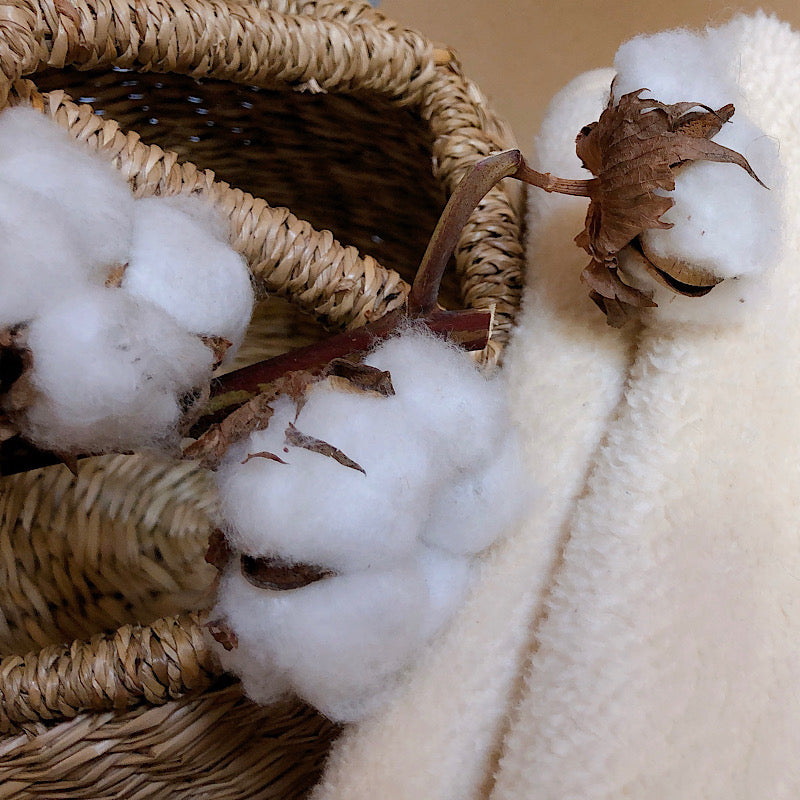Last year, I think, was a year in which I felt I wanted to cherish the time I had to relax and unwind.
I'm sure many people have reconsidered the way they live by collecting high-quality items that appeal to their tastes.
I am one of them. In this new lifestyle, I felt that rather than forgetting how to turn on my motivation switch, I didn't know how to turn it off properly.
But I think the biggest change is that I've started to be conscious of going vegan in all aspects of my life, including food, clothing, and shelter. But I'll talk about that another time.
In this column, I would like to learn and talk with you about the various things related to organic cotton that Asami has become obsessed with during this time at home.
■ Organic cotton is becoming more common these days
I know that "no pesticides or fertilizers have been used for more than three years," but what's so good about it? Thinking about it again, I might not have understood it as well as I thought. Let's take a closer look at what kind of changes choosing organic cotton can bring about!
■Is the amount of water used different?
How much water does it take to make one cotton T- shirt?
Cotton = 2,700L
Organic cotton = 243L
Organic cotton is often grown on a small scale, and farmers make good use of rainwater. Furthermore, because they don't use synthetic pesticides or fertilizers, they use less water. Water pollution is reduced by an astounding 98 %! Receiving the blessings of heaven and storing their power may seem like a given, but it may be very valuable in today's world.
■ Greenhouse gas emissions
Data shows that organic cotton is 46 % less effective than pesticide-based farming because it doesn't rely on mechanized farming and healthy soil absorbs CO2 . On the other hand, there are also reports that it may emit more greenhouse gases. The world of organic cotton still has a long way to go. It's worth keeping an eye on!
■About pesticides

Cotton is a natural fiber that has a somewhat environmentally friendly image compared to synthetic fibers. But did you know that a considerable amount of chemical fertilizers and pesticides are actually used on it? There are many different types, such as for pest control, weed management, mold prevention, sterilization, disinfection, and defoliants before harvesting. It is known that this not only pollutes the soil and water, but also has an impact on the health of farmers.
After continued use and covered in chemicals, the soil no longer has the power to grow plants, so forests are cut down to secure new land. Preventing pests and weeds = depriving the soil of nutrients. This completely takes away the power that living things rely on in their natural cycle, and the environment becomes one in which plants cannot grow without the application of artificial fertilizer. What a vicious cycle.
What would happen to the Earth if this practice continued all over the world? What would happen to the Earth if we, the consumers, continued to ignore it? I want to put a stop to this cycle, even if only a little, so I try to choose organic vegetables and hemp clothes as much as possible. I hope that everyone reading this column will also make small, kind changes through the selections made by It's so easy .
■It's not just the cultivation method that counts! / What it takes to be recognized as organic cotton

1. The traceability and content of organic raw materials is ensured throughout the entire manufacturing process ( spinning, weaving, knitting, dyeing, sewing, etc. )
2. The burden on health and the environment is kept to a minimum.
3. It is manufactured in accordance with safe labor and social standards.
Only after undergoing these checks and certification from a third-party organization can the cotton be labeled as "organic." Even after certification, the cotton is checked every year, so it's easy to tell when and where the cotton was harvested for organic cotton products!
Organic cotton has become more common recently, but it actually accounts for less than 1 % of the cotton currently produced. That's why, as a consumer, I want to support farmers and producers who are making earth-friendly choices.
■ Thinking about what to buy/What we can do

We live in an age where things are made effortlessly. Think about the last time you chose something and thought, "I want to use this for the rest of my life." Have you ever thought, "Because it's easy to do," or "This is cheaper," and forgotten what you really value in your heart?
I think it's okay to start simply because something is fashionable or cute. Believe in the power of each and every one of our daily choices and take a breather.
Start by doing one thing at a time, such as, "Clothes made from natural fibers feel more comfortable than those made from synthetic fibers," or, "Plastic clothes are cheap, but I'd like to be able to take care of wooden ones and use them for a long time."
Why not try It's so easy?
In the next STAFF'S VOICE, we will introduce organic cotton items.
We will select products that you can actually buy at I's so easy. Look forward to it!
STAFF: Asami

